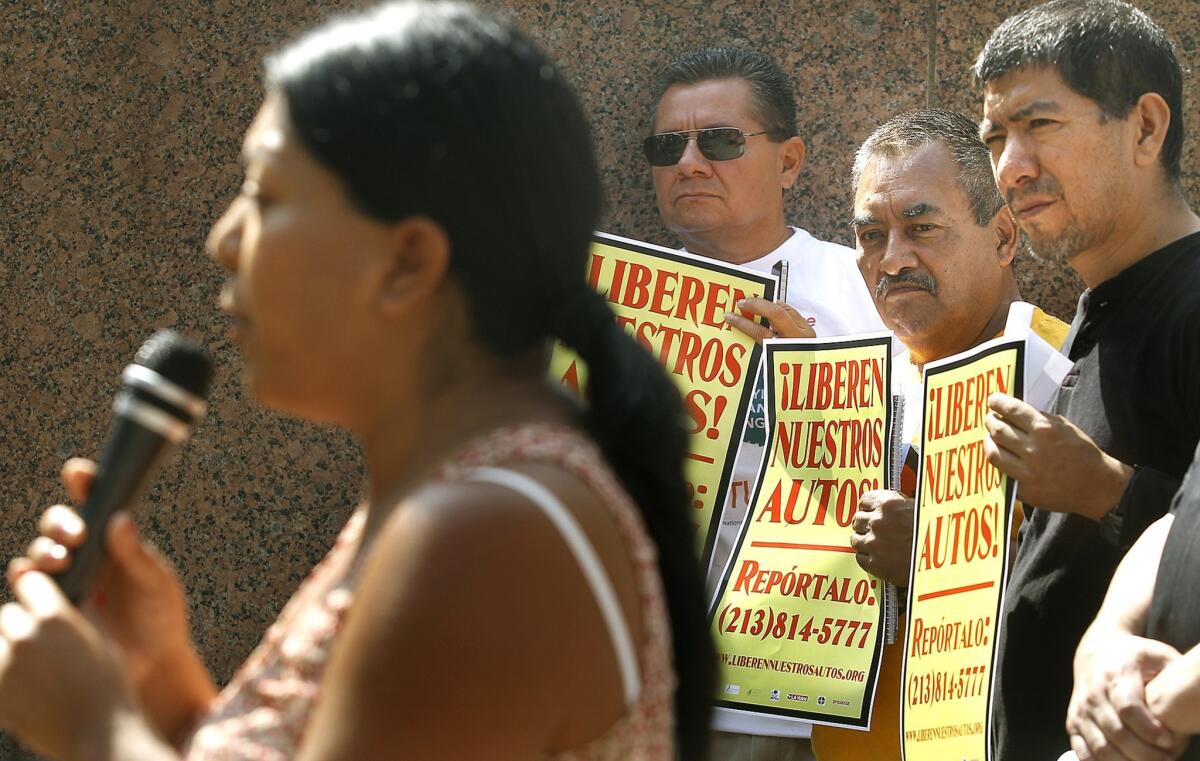Appellate judges question opponents of LAPD impound policy

- Share via
Appellate judges on Wednesday grilled attorneys opposing a controversial Los Angeles Police Department policy restricting the impounding of unlicensed drivers’ cars, questioning whether the city’s police union and a taxpayer had standing to challenge the policy in the first place.
The jurists are considering an appeal by the city of a trial court ruling that the order from LAPD Chief Charlie Beck violated state law. Beck issued the policy in 2012, contending that 30-day holds on impounded vehicles disproportionately and unfairly burdened immigrants in Los Angeles who are in the country illegally and unable to get licenses.
The Los Angeles Police Protective League sued the city to challenge the impound rule, Special Order 7, arguing that it was in conflict with state law and exposed officers to civil liability.
Justice Elizabeth Grimes, part of a three-judge panel of the 2nd District Court of Appeal, asked an attorney for the protective league why the union would want to challenge the order barring a practice that could “foment” discontent and confusion in the community.
“What possible harm could come to the league or to the officers from following Special Order 7? They can’t sleep at night?” she said. “Why does the league have beef with this? What’s it to you?”
Union attorney Richard Levine responded that officers have an inherent interest in making sure orders issued by the chief are in line with state law. The chief’s order goes against the intent behind state laws designed to discourage unlicensed drivers and “prevent accidents and protect the welfare and safety of Californians,” he said.
Justice Laurence Rubin remarked that allowing the union to sue because officers don’t agree with the chief’s interpretation of state law “puts the judiciary in a terrible position of adjudicating disagreements between the chief and line officers.”
Grimes also questioned the involvement of conservative watchdog group Judicial Watch, which joined the lawsuit on behalf of a taxpayer. Noting that taxpayers are allowed to sue for illegal or wasteful acts by the government, she said: “I don’t catch a whiff of illegal or wasteful.”
The justices also quizzed attorneys on whether the LAPD order runs contrary to the state vehicle code sections that allow, but don’t require, officers to impose a 30-day hold on the impounded vehicles of those caught driving without a license. The union and Judicial Watch contend that the law is designed to give individual officers discretion and that it is in violation of California law for Beck to order his officers not to place the hold.
Rubin tested their argument by proposing a hypothetical: If a rookie officer wanted to impound the vehicle of an unlicensed driver and his training officer told him not to, is that training officer also violating state law?
“Don’t we have here, essentially, the chief saying to the rookie officer, in these situations the discretion is to be applied in this way?” he asked.
Levine responded that the department could offer guidelines or training but that it could not mandate its officers to apply the law a certain way and take away their discretionary power. Judicial Watch attorney Paul Orfanedes said the order amounted to a change in state law rather than a management decision.
“The Legislature wanted to say to everyone in the state, if you don’t have a license your vehicle will be impounded. That was true until Special Order 7,” Orfanedes said. “Los Angeles has thumbed its nose at that.”
James Clark, chief deputy city attorney, said it was well within the city’s right to set such policies for its police force. The order gives consistency to how and when vehicles are impounded and holds are imposed, a “really serious remedy” that affects people’s ability to work and to take their children to school, he said. The 30-day hold also comes with fines in excess of $1,000.
Other cities around the state, including Santa Ana, San Jose and Baldwin Park, have set their own impound policies, Clark told the justices.
The city was joined in its defense of the order by a coalition of immigrants’ rights groups, represented in court by the American Civil Liberties Union. The League of California Cities and the California attorney general also filed amicus briefs siding with the city and saying the order was lawful.
More to Read
Sign up for Essential California
The most important California stories and recommendations in your inbox every morning.
You may occasionally receive promotional content from the Los Angeles Times.











